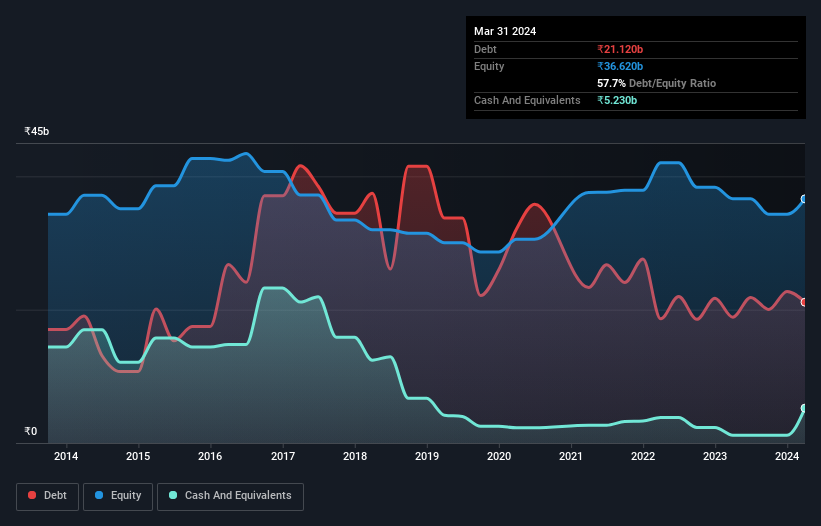The external fund manager backed by Berkshire Hathaway's Charlie Munger, Li Lu, makes no bones about it when he says 'The biggest investment risk is not the volatility of prices, but whether you will suffer a permanent loss of capital.' It's only natural to consider a company's balance sheet when you examine how risky it is, since debt is often involved when a business collapses. We can see that Wockhardt Limited (NSE:WOCKPHARMA) does use debt in its business. But is this debt a concern to shareholders?
When Is Debt Dangerous?
Debt is a tool to help businesses grow, but if a business is incapable of paying off its lenders, then it exists at their mercy. If things get really bad, the lenders can take control of the business. However, a more frequent (but still costly) occurrence is where a company must issue shares at bargain-basement prices, permanently diluting shareholders, just to shore up its balance sheet. Of course, plenty of companies use debt to fund growth, without any negative consequences. The first step when considering a company's debt levels is to consider its cash and debt together.
See our latest analysis for Wockhardt
What Is Wockhardt's Net Debt?
As you can see below, at the end of March 2024, Wockhardt had ₹21.1b of debt, up from ₹18.9b a year ago. Click the image for more detail. However, it does have ₹5.23b in cash offsetting this, leading to net debt of about ₹15.9b.

How Healthy Is Wockhardt's Balance Sheet?
We can see from the most recent balance sheet that Wockhardt had liabilities of ₹27.9b falling due within a year, and liabilities of ₹12.0b due beyond that. Offsetting this, it had ₹5.23b in cash and ₹6.18b in receivables that were due within 12 months. So it has liabilities totalling ₹28.5b more than its cash and near-term receivables, combined.
While this might seem like a lot, it is not so bad since Wockhardt has a market capitalization of ₹130.9b, and so it could probably strengthen its balance sheet by raising capital if it needed to. But we definitely want to keep our eyes open to indications that its debt is bringing too much risk. The balance sheet is clearly the area to focus on when you are analysing debt. But you can't view debt in total isolation; since Wockhardt will need earnings to service that debt. So if you're keen to discover more about its earnings, it might be worth checking out this graph of its long term earnings trend.
In the last year Wockhardt wasn't profitable at an EBIT level, but managed to grow its revenue by 6.5%, to ₹28b. That rate of growth is a bit slow for our taste, but it takes all types to make a world.
Caveat Emptor
Over the last twelve months Wockhardt produced an earnings before interest and tax (EBIT) loss. To be specific the EBIT loss came in at ₹210m. When we look at that and recall the liabilities on its balance sheet, relative to cash, it seems unwise to us for the company to have any debt. Quite frankly we think the balance sheet is far from match-fit, although it could be improved with time. For example, we would not want to see a repeat of last year's loss of ₹4.6b. So to be blunt we do think it is risky. When analysing debt levels, the balance sheet is the obvious place to start. But ultimately, every company can contain risks that exist outside of the balance sheet. To that end, you should learn about the 3 warning signs we've spotted with Wockhardt (including 1 which is a bit concerning) .
At the end of the day, it's often better to focus on companies that are free from net debt. You can access our special list of such companies (all with a track record of profit growth). It's free.
Valuation is complex, but we're here to simplify it.
Discover if Wockhardt might be undervalued or overvalued with our detailed analysis, featuring fair value estimates, potential risks, dividends, insider trades, and its financial condition.
Access Free AnalysisHave feedback on this article? Concerned about the content? Get in touch with us directly. Alternatively, email editorial-team (at) simplywallst.com.
This article by Simply Wall St is general in nature. We provide commentary based on historical data and analyst forecasts only using an unbiased methodology and our articles are not intended to be financial advice. It does not constitute a recommendation to buy or sell any stock, and does not take account of your objectives, or your financial situation. We aim to bring you long-term focused analysis driven by fundamental data. Note that our analysis may not factor in the latest price-sensitive company announcements or qualitative material. Simply Wall St has no position in any stocks mentioned.
Have feedback on this article? Concerned about the content? Get in touch with us directly. Alternatively, email editorial-team@simplywallst.com
About NSEI:WOCKPHARMA
Wockhardt
Operates as a pharmaceutical and biotech company, in India, the United States, the United Kingdom, Switzerland, Ireland, Russia, Europe, and internationally.
Flawless balance sheet with very low risk.
Similar Companies
Market Insights
Community Narratives



